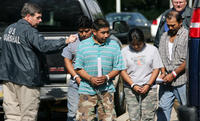-
Reports: hundreds killed in chemical weapons attack east of Damascus
Syrian rebels say at least 750 people were killed in attacks on villages in rebel-held areas in the Ghouta region east of Damascus. News agencies quote medical personnel who confirmed that hundreds of victims treated in hospitals and make-shift first-aid stations were suffering from symptoms associated with chemical weapons attack. Syrian government officials deny that regime forces used chemical weapons. The Arab League called for immediate investigation, and the U.K. said it would bring the reports to the UN Security Council today.
-
-
Immigration reform bill would add 13,992 jobs per congressional district
The Senate’s immigration bill would add, on average, 13,992 new jobs in each congressional district in the United States over the next decade. This is one of the findings of an analysis offered by the conservative American Action Network (AAN). The group supports the reform of the U.S. immigration law and is active in the effort to persuade GOP House members to support the Senate immigration reform bill.
-
-
Rapid response, imaging of injuries aided Boston Marathon bombing victims
According to the Centers for Disease Control and Prevention (CDC), bombing survivors have the highest incidence of injury to soft tissue and musculoskeletal systems with the most extreme injury being traumatic amputation, which is reported in up to 3 percent of cases. The Boston Marathon bombings resulted in three fatalities and 264 casualties, with the most severe injuries involving lower extremities of those located closest to the blasts. Blast injuries within civilian populations are rare in the United States, so when they do occur they challenge the medical community rapidly to respond to concurrent evaluation and treatment of many victims.
-
-
Suburban Chicago police cancels anti-terrorism training course after complaints
The police at the city of Lombard, Illinois, has cancelled a class on counterterrorism after the Chicago branch of a Muslim advocacy group complained that the Florida-based instructor and his teachings were blatantly anti-Muslim. The instructor has faced similar criticism in Florida. The course was to be taught through the North East Multi-Regional Training group, which trains Illinois police and corrections employees. The Illinois Law Enforcement Training and Standards Board said it was reviewing the course – titled “Islamic Awareness as a Counter-Terrorist Strategy” – and the materials used in it. The board said that instructor’s qualifications will also be reviewed.
-
-
U.K. detains, questions NSA revelations journalist’s partner
David Miranda, the partner of Guardian’s Glenn Greenwald who interviewer Edward Snowden and who wrote several stories based on documents provided by Snowden, was detained for nine hours by U.K. authorities at Heathrow Airport and questioned under schedule 7 of the Terrorism Act 2000. Miranda was released – schedule 7 allows a suspect to be held for a maximum of nine hours, and then the police must release or formally arrest the individual. – but the electronic equipment he was carrying with him, including his mobile phone, laptop, camera, memory sticks, DVDs, and games consoles were confiscated by the authorities.
-
-
AQAP now central pillar of a decentralized al Qaeda

Since he escaped a Yemeni jail in 2006, Nasir al-Wuhayshi, 36, has turned Al Qaeda in the Arabian Peninsula (AQAP) into the most effective component of a more decentralized al Qaeda. The Obama administration has continued, and expanded, the Bush administration’s war on al Qaeda central, destroying the organization’s capabilities and reducing its effectiveness to a point where the remnants of al Qaeda core in Pakistan no longer exercise operational control over terrorist activities carried out in the name of the organization. This has allowed franchise terror outfits to emerge in the Middle East and North and West Africa – and of these largely autonomous organizations, AQAP, under al-Wuhayshi’s leadership, has proven itself the most innovative and technically savvy.
-
-
Islamic group’s plan for a 9/11 "Million Muslim March" on Washington denounced
The American Muslim Political Action Committee (AMPAC) is organizing what it hopes would be a mass demonstration by American Muslims on 11 September in Washington, D.C. Critics called the demonstration ill-timed, if not downright offensive. Mainstream Muslim American groups describe group members as virulently anti-Semitic “truthers” who question al Qaeda’s responsibility for the 9/11 attacks. There is little chance a million people would show up for the march: AMPAC, based in Kansas City, Missouri, has just 57 supporters signed up for the 11 September event on Facebook.
-
-
NSA revelations hobble pursuit of a comprehensive cyberdefense initiative
NSA director General Keith Alexander has proposed a digital version of Ronald Reagan’s space-based Star Wars missile defense program, which Reagan unveiled in 1983. In Alexander’s vision, when a cyberattack is launched at the United States, the defense system would intercept and thwart the attack before it caused any damage. Intercepting a cyberattack would require the NSA to tap, track, and scan all cyber traffic entering the United States. The technology needed to intercept cyberattacks, however, is strikingly similar to the technology the NSA uses for the types of surveillance Snowden exposed. Post-Snowden, it is doubtful that the administration would pursue a comprehensive cyberdefense initiative, or that lawmakers would accept it.
-
-
U.S. nuclear reactors vulnerable to terrorist attack: study
More than ten years after the 9/11 hijackers considered flying a fully loaded passenger jet into a Manhattan area nuclear reactor, U.S. commercial and research nuclear facilities remain inadequately protected against two credible terrorist threats — the theft of bomb-grade material to make a nuclear weapon, and sabotage attacks intended to cause a reactor meltdown. A new report finds that none of the 104 commercial nuclear power reactors in the United States is adequately protected — but among the most vulnerable are eleven reactors in California, Connecticut, Florida, Maryland, Massachusetts, Missouri, New York, North Carolina, Texas, and Virginia. One of these reactors, on the grounds of the National Institute of Standards and Technology (NIST), is among the three research reactors fueled with bomb-grade uranium, and is located in the Washington, D.C. suburb of Gaithersburg, less than twenty-five miles from the White House.
-
-
Gen. Dempsey: U.S. military options against Iran “better” than last year
General Martin Dempsey, the chairman of the Joint Chiefs of Staff who is on an official visit to Israel and Jordan this week, said that in his meeting with Israeli leaders he told them that “since I was here last year [October 2012], [the United States has] better military options than we did a year ago” to deal with Iran’s nuclear weapons program. “That’s because we’ve continued to refine them,” he said. “We’ve continued to develop technology, we’ve continued to train and plan.”
-
-
Egypt under martial law; 525 die in clashes (updated)
The Egyptian government said 525 were killed, including 43 police officers, during clashes Wednesday between Egyptian security forces and supporters of the Muslim Brotherhood as the Egyptian police and army moved to clear two sit-in camps in which supporters of Mohammen Morsi had been barricading. The Egyptian government has declared a month-long state of emergency throughout the country. The main features of the state of emergency include a curfew which would run from 7:00 p.m. until 6:00 a.m. in eleven of Egypt’s twenty-seven provinces, including Suez, heavy presence of military units in cities and towns, and restrictions on movement and travel.
-
-
Egypt declares month-long state of emergency; hundreds die in clashes
About 150 Egyptians were killed during the early hours of Wednesday in clashes between Egyptian security forces and armed supporters of the Muslim Brotherhood as the Egyptian police and army moved to clear two sit-in camps in which supporters of Mohammen Morsi had been barricading. Well-organized Brotherhood supporters set police stations and government building on fire in several cities. Brotherhood followers also burned down the Alexandria public library and five churches. The Egyptian government has declared a month-long state of emergency throughout the country. The main features of the state of emergency include a curfew which would run from 7:00 p.m. until 6:00 a.m. in eleven of Egypt’s twenty-seven provinces, including Suez, heavy presence of military units in cities and towns, and restrictions on movement and travel.
-
-
Lawmakers, scientists question FBI’s investigation, conclusion in 2001 anthrax attacks

Twelve years after the fall 2001 anthrax attacks, and six years after the 2007 FBI’s determination that Bruce Ivins, a top government anthrax researcher at the U.S. Army Medical Research Institute of Infectious Diseases (USAMRIID), was the perpetrator of the attacks (Ivins died in 2008 of apparent suicide), lawmakers and USAMRIID scientists insist that the FBI’s conclusions are not supported by scientific evidence – indeed, that some basic scientific facts make the Bureau’s conclusions untenable.
-
-
U.S. nuclear facilities vulnerable to terrorist attack: study

Some U.S. nuclear facilities are inadequately protected against theft of weapons-grade materials and sabotage by terrorists. Terrorist attacks on vulnerable nuclear facilities could trigger a meltdown or lead to a diversion of bomb-grade uranium. The danger is far from hypothetical since the 9/11 hijackers are known to have considered flying a passenger jet into a U.S. nuclear reactor before they settled on the World Trade Center as their main terror target.
-
-
The administration does not follow its own deportation criteria

The Obama administration has set a record for deporting illegal immigrants, but the administration’s declared policy is to concentrate on criminals and other illegal immigrants who pose a risk. Yet, the administration has also been deporting immigrants who are not top priority according to the administration’s own criteria, and who may be eligible for legal residency if Congress reforms immigration law.
-
More headlines
The long view
Factories First: Winning the Drone War Before It Starts
Wars are won by factories before they are won on the battlefield,Martin C. Feldmann writes, noting that the United States lacks the manufacturing depth for the coming drone age. Rectifying this situation “will take far more than procurement tweaks,” Feldmann writes. “It demands a national-level, wartime-scale industrial mobilization.”
No Nation Is an Island: The Dangers of Modern U.S. Isolationism
The resurgence of isolationist sentiment in American politics is understandable but misguided. While the desire to refocus on domestic renewal is justified, retreating from the world will not bring the security, prosperity, or sovereignty that its proponents promise. On the contrary, it invites instability, diminishes U.S. influence, and erodes the democratic order the U.S. helped forge.
Fragmented by Design: USAID’s Dismantling and the Future of American Foreign Aid
The Trump administration launched an aggressive restructuring of U.S. foreign aid, effectively dismantling the United States Agency for International Development (USAID). The humanitarian and geopolitical fallout of the demise of USAID includes shuttered clinics, destroyed food aid, and China’s growing influence in the global south. This new era of American soft power will determine how, and whether, the U.S. continues to lead in global development.
Water Wars: A Historic Agreement Between Mexico and US Is Ramping Up Border Tension
As climate change drives rising temperatures and changes in rainfall, Mexico and the US are in the middle of a conflict over water, putting an additional strain on their relationship. Partly due to constant droughts, Mexico has struggled to maintain its water deliveries for much of the last 25 years, deliveries to which it is obligated by a 1944 water-sharing agreement between the two countries.
How Disastrous Was the Trump-Putin Meeting?
In Alaska, Trump got played by Putin. Therefore, Steven Pifer writes, the European leaders and Zelensky have to “diplomatically offer suggestions to walk Trump back from a position that he does not appear to understand would be bad for Ukraine, bad for Europe, and bad for American interests. And they have to do so without setting off an explosion that could disrupt U.S.-Ukrainian and U.S.-European relations—all to the delight of Putin and the Kremlin.”
How Male Grievance Fuels Radicalization and Extremist Violence
Social extremism is evolving in reach and form. While traditional racial supremacy ideologies remain, contemporary movements are now often fueled by something more personal and emotionally resonant: male grievance.
